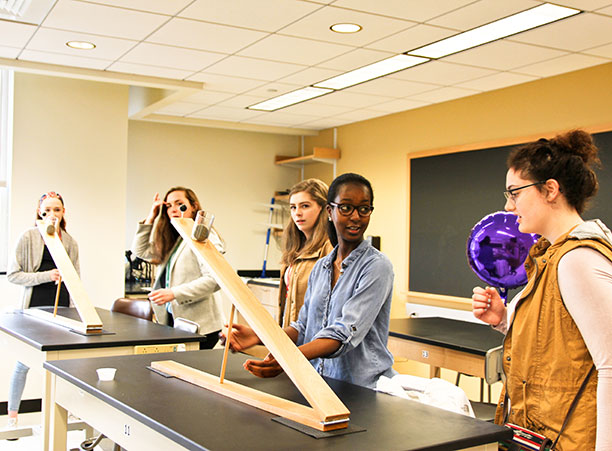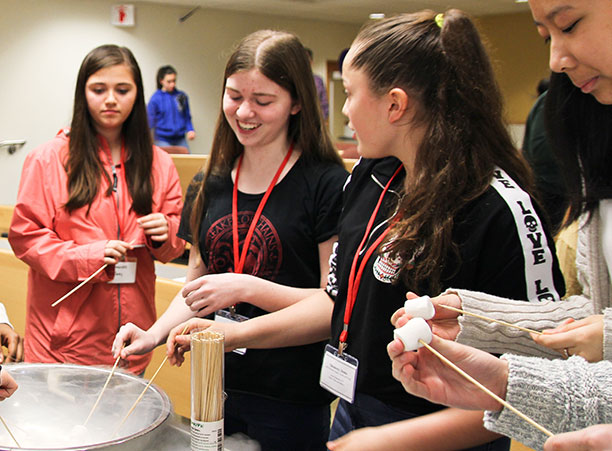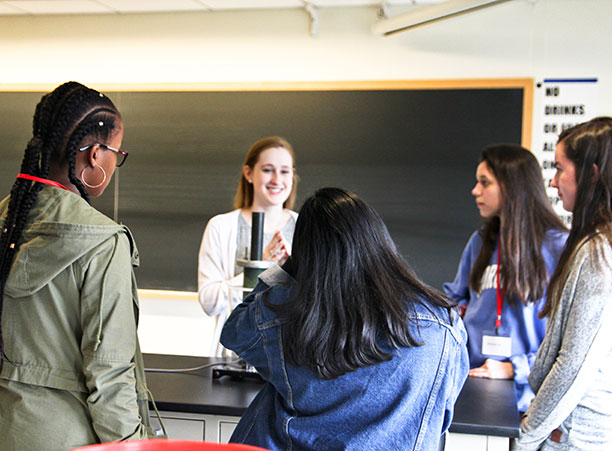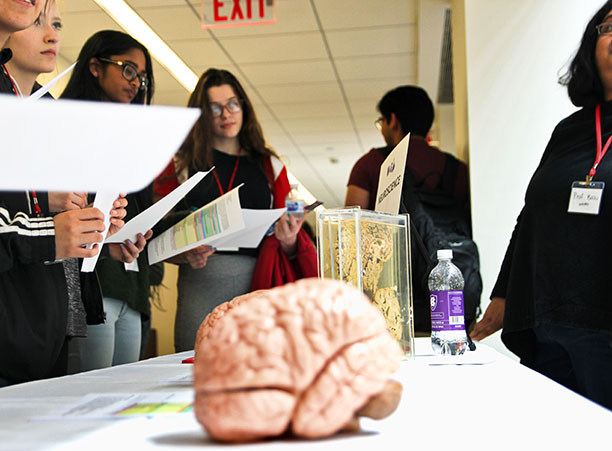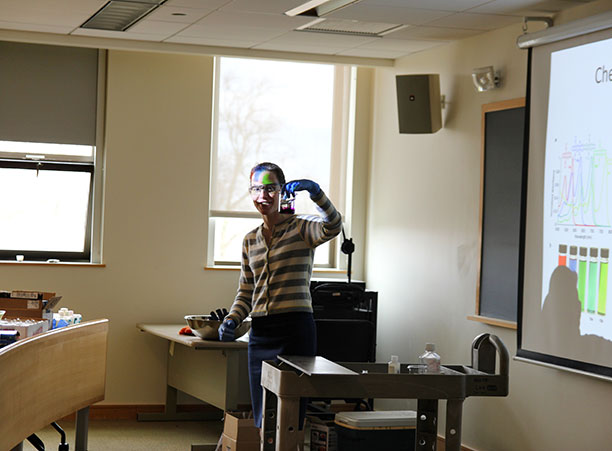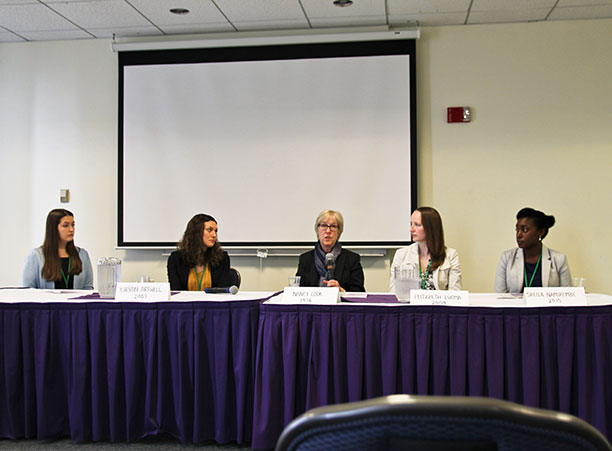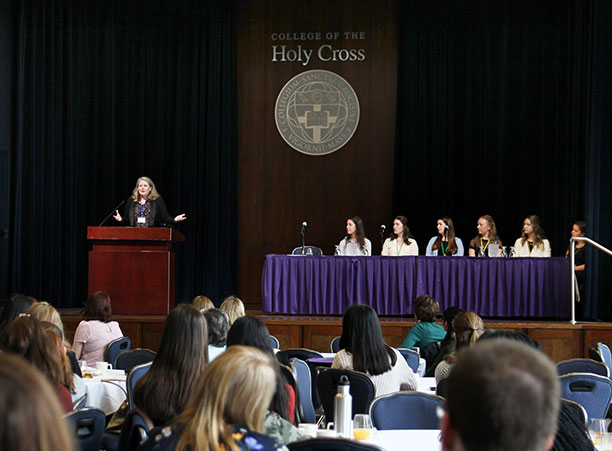To the standard acronym for STEM — science, technology, engineering, math — Holy Cross adds an important letter: W. From professors who serve as mentors to female students, to students who in turn empower high school girls, the Holy Cross community takes a collaborative, cooperative approach to supporting women studying STEM.
The College offers STEM classes in a range of majors — namely biology, chemistry, mathematics, computer science and physics. And following a national trend, a smaller percentage of those majors are women.
"Historically, women have been a minority group in mathematical sciences and computer science fields," says Sarah McGuire '19 a mathematics major with a minor in computer science and one of the 2018-2019 Clare Boothe Luce scholarship recipients.
"It's great that this trend is changing as more women seek degrees in STEM fields, but the U.S. Census Bureau reports only 24 percent of undergraduate degrees earned by women are in these fields. If we want to increase representation of women in STEM careers, we need to change young females' attitudes towards mathematics and computer science."
Daniel Bitran, professor of psychology and science coordinator, agrees that there is a clear gender gap in STEM fields.
"Many women in the field speak of that. Even though they're successful, they face challenges in making their mark. We work hard to facilitate the budding of students who want to pursue STEM."
Studying STEM: How Holy Cross Celebrates Women in Science, Math and More
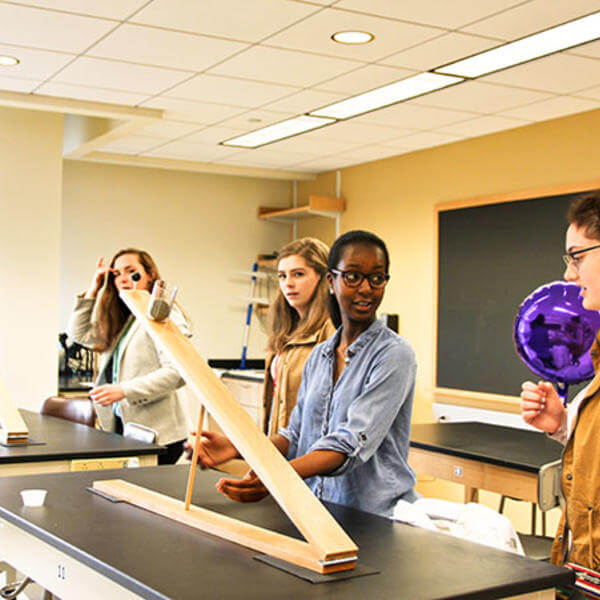
One-on-one mentoring and events like Girls Can Code and Women in Science Day help female STEM students thrive
Read Time
For Abby Corrigan '19, a physics major and the other 2018-2019 Clare Boothe Luce scholarship recipient, the STEM connection started her first year on the Hill. She took Physics 1 with Janine Shertzer, Distinguished Professor of Science in the physics department, and the two hit it off.
"Since then, I have taken five courses with her. This year I also had the opportunity to complete a research project with her studying variations of the 1D Finite Well. Having that kind of connection with a professor has been incredibly meaningful and rewarding."
Corrigan points out that physics is a male-dominated major, but that gender has hardly been a limiting factor. "I have always felt supported and respected as a woman in STEM."
Shertzer says it's important for the college to champion its female scientists for a simple but profound reason: "Women make up 50% of the available brainpower." She also notes that the College has been supportive of its female faculty members.
"The College has been consistently hiring and tenuring women faculty in the sciences for over 40 years. Our female STEM majors have mentors from the day they arrive on campus."
That's true for McGuire, who says faculty mentorship has been a key to her success — and has inspired her to pass the torch. Earlier this semester, McGuire planned Girls Can Code Day, where roughly 30 middle school girls came to campus to learn basic coding skills.
"Our goal was to teach students basic concepts of coding, to share the importance of problem solving and to promote positive attitudes towards computer science and mathematics," McGuire says.
Inspiring the Next Generation
McGuire, Corrigan, and a team of other female STEM students helped coordinate another important event on campus — the 3rd Annual Women in Science Day for both female Holy Cross students and area high school students. Throughout the day, Holy Cross students led laboratory demonstrations for over 100 high school students, introducing them to the world of STEM at the collegiate level. At the same time, nearly 20 Holy Cross STEM alumnae spoke on panels — representing industries and academic positions from neonatologist to chemistry teacher — with plenty of built-in time to network.
Jennifer Franks '20, a biology major who helped plan the Women in Science Day, came away with a sense of possibility.
"It's important to highlight how women can go into STEM careers that span across healthcare, research and industry."
The keynote address was delivered by alumna Courtney Kennedy '91, a physics major who's making her mark in Silicon Valley, first at Apple, where she managed teams of engineers and now at Netflix, where she manages a team working on the video player inside the Netflix app. She encouraged the women at the conference to embrace diversity.
"You all have your own set of experiences and perspectives on the world. So many disciplines in science and technology and engineering right now have too few women in them. As you pursue your careers in STEM, you'll bring those with you and increase the diversity of organizations that you join."
Kennedy ended with an empowering thought.
"Remember the value you bring. Having different perspectives and different approaches to problems will not only help you be successful, but it will also change the industries you work in — and it will give the whole world a new set of options."
